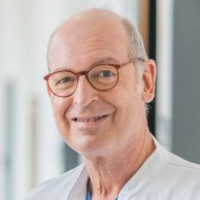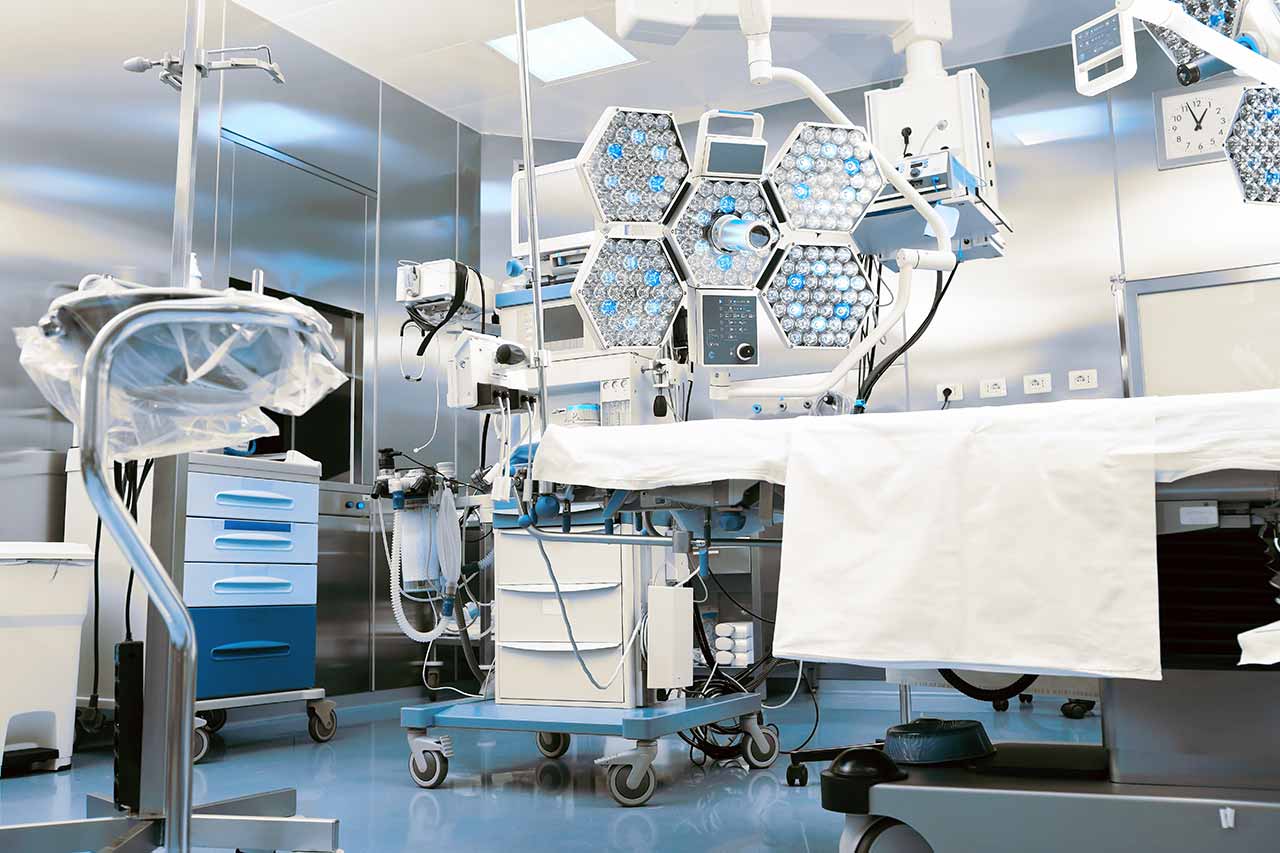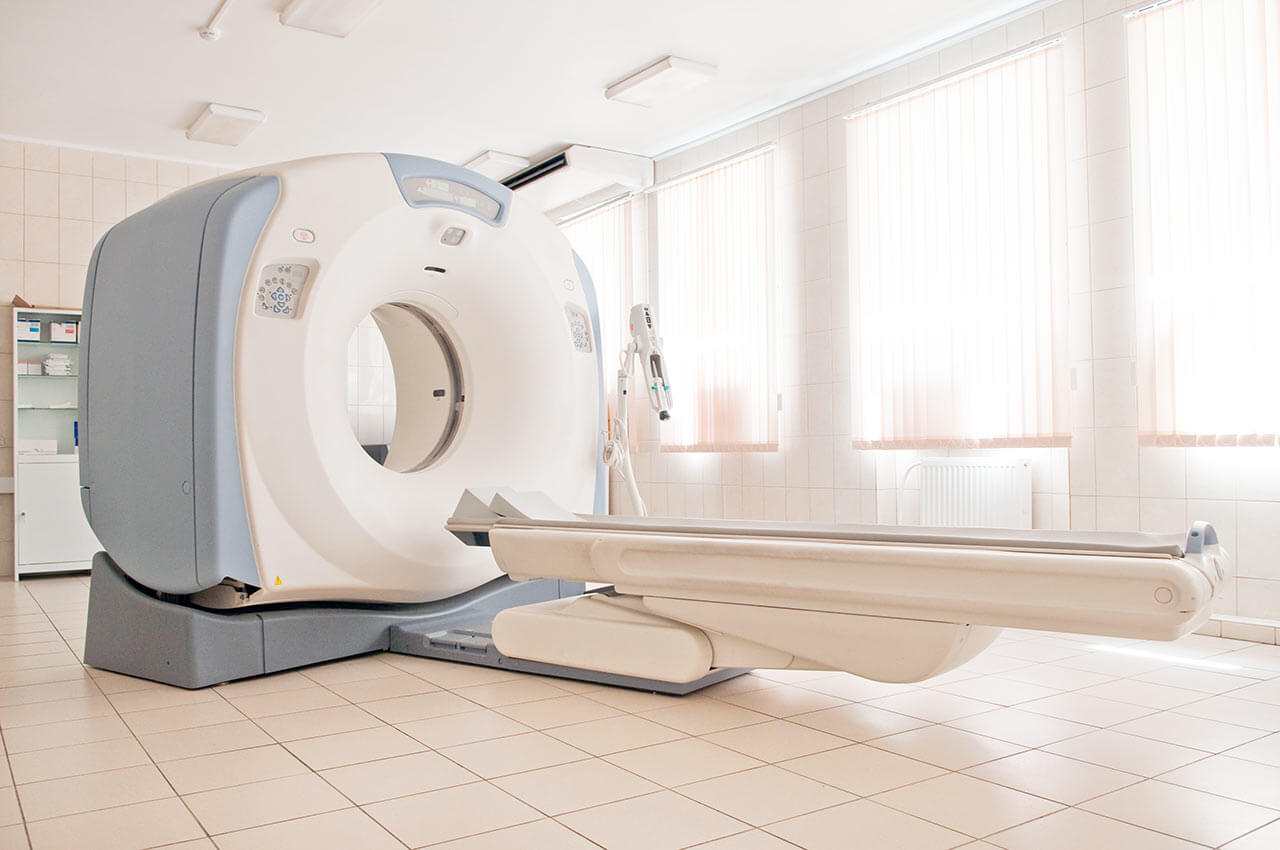
The program includes:
- Initial presentation in the clinic
- clinical history taking
- review of medical records
- physical examination
- urological examination
- laboratory tests:
- complete blood count
- general urine analysis
- biochemical analysis of blood
- inflammation indicators (CRP, ESR)
- indicators blood coagulation
- tumor marker
- ultrasound of the urogenital system
- preoperative care
- surgical excision of uretral polyp
- symptomatic treatment
- control examinations
- the cost of essential medicines and materials
- nursing services
- full hospital accommodation
- explanation of future recommendations
Service
You may also book:
 BookingHealth Price from:
BookingHealth Price from:
About the department
The Department of Adult and Pediatric Urology, Andrology at the Paracelsus Clinic Golzheim Duesseldorf offers the full range of medical services for diagnosing and treating various urinary diseases in women and men, as well as pathologies of the male reproductive system. The department admits both adult and pediatric patients. Of particular interest to the department's team of doctors is the treatment of benign prostatic hyperplasia, kidney stone disease, kidney diseases, as well as urinary incontinence in men and women. The department's specialists also treat andrologic diseases in men, such as erectile dysfunction, ejaculatory disorders, male infertility, and hormonal disorders in men. Doctors have state-of-the-art diagnostic equipment, allowing them to provide the most accurate diagnostics, which is the key to a successful treatment outcome. Therapeutic options range from drug therapy with modern medicines, laser procedures, sparing minimally invasive surgery, to classical open surgery.
The Head Physician of the department is Prof. Dr. med. M.sc. Johannes Maria Wolff. The specialist has tremendous experience, which he has acquired in prestigious university hospitals in Germany, and also regularly demonstrates high treatment success rates. He is a Fellow of the European Board of Urology (FEBU) and has an excellent reputation not only in Germany but throughout Europe.
The primary focus of the department's urologists is the diagnostics and treatment of benign prostatic hyperplasia. This pathology occurs quite often in men, so there are many effective treatment methods available today, such as transurethral resection of the prostate, laser vaporization, and laser enucleation. At the early stages of the pathology, it is possible to achieve a good result with an effective drug therapy regimen. The treatment tactics are determined solely on an individual basis.
The department's doctors also specialize in treating kidney stone disease. To do this, a highly specialized center was created here, within the walls of which more than 1,000 patients with this diagnosis are treated every year. During the diagnostics, a patient is prescribed blood and urine tests, high-resolution ultrasound imaging, computed tomography, and, in some cases, X-ray scans, including those with contrast enhancement. The department's doctors quite often carry out effective drug therapy that allows them to remove stones in a natural way. Other therapeutic options for stone management include extracorporeal shock wave lithotripsy (ESWL), ureterorenoscopy (an endoscopic procedure), percutaneous nephrolithotomy (a minimally invasive procedure), and open stone surgery. The last treatment option is a very rare option.
Urinary incontinence in men and women is treated using the latest medical advances in this field. The department's doctors most often have to deal with such forms of incontinence as stress urinary incontinence, urge incontinence, and mixed forms of incontinence. The department's doctors have excellent qualifications in treating enuresis in children. Incontinence treatment methods range from electrical stimulation, biofeedback, drug therapy, Botulinum toxin A injection therapy, to surgical methods, such as TVT or TOT procedures, laparoscopic colpopexy (a Burch procedure) in women, sling procedures, and artificial sphincter implantation in men.
The scope of tasks of the department's doctors also includes the provision of medical care to children with urologic diseases and malformations of the urinary tract and organs of the reproductive system. The most common urologic disorders in children include undescended testicles (cryptorchism), hydrocele, varicocele, phimosis, hypospadias, epispadias, enuresis, and recurrent urinary tract infections. Enuresis and infectious lesions can be eliminated with the help of modern medicines. As for the other pathologies listed above, the most effective treatment method is surgical repair. As a rule, doctors perform minor interventions on an outpatient basis.
Andrology is an integral part of clinical activity. Of particular interest is impotence and male infertility treatment. The department performs sterilization procedures as well as operations to restore fertility after a vasectomy (a vasovasostomy). The intervention is performed with microsurgical techniques, which contributes to the patient's fastest recovery and minimal pain. Male infertility can be treated with modern sperm retrieval procedures such as TESE (testicular sperm extraction) and MESA (microsurgical epididymal sperm aspiration). In addition, the department's doctors specialize in repairing penile curvature and other malformations, such as urethral malformations, testicular malposition, etc. Medical care for age-related changes, for example, hormonal ones, is also within the department's competence.
The department's range of medical services includes:
- Diagnostics and treatment of benign urinary diseases in men and women, as well as diseases of the reproductive system in men
- Prostatitis
- Drug therapy
- Benign prostatic hyperplasia
- Drug therapy
- Transurethral resection of the prostate
- Laser vaporization of the prostate
- Laser enucleation of the prostate
- Kidney stone disease
- Drug therapy
- Extracorporeal shock wave lithotripsy (ESWL)
- Ureterorenoscopy (an endoscopic procedure)
- Percutaneous nephrolithotomy (a minimally invasive procedure)
- Open surgery to remove stones
- Recurrent inflammatory processes of the urinary system in women and men
- Drug therapy
- Prostatitis
- Diagnostics and treatment of all forms of urinary incontinence in men and women, including enuresis in children
- Methods for pelvic floor muscle strengthening
- Electrical stimulation
- Biofeedback
- Magnetotherapy
- Training on vibration simulators
- Pessary use
- Drug therapy
- Botulinum toxin A injection therapy
- Surgical treatment of urinary incontinence (separate techniques for men and women), including the da Vinci surgical system: sacrocolpopexy, colposuspension and pectopexy
- Sacral neuromodulation
- Methods for pelvic floor muscle strengthening
- Diagnostics and treatment of urologic diseases and genitourinary malformations in children
- Drug therapy for enuresis and infectious urinary diseases
- Surgical treatment of malformations of the penis, testicles, and epididymis (for example, phimosis and undescended testicles)
- Diagnostics and treatment of andrologic diseases
- Sterilization
- Vasovasostomy (a surgical interventions designed to restore fertility after a vasectomy)
- Surgical sperm retrieval for male infertility
- Testicular sperm extraction (TESE)
- Microsurgical epididymal sperm aspiration (MESA)
- Treatment of erectile dysfunction (impotence)
- Hormone replacement therapy
- Intake of oral and topical drugs (for example, Viagra, intracavernous body injection therapy)
- Vacuum pumps
- Vascular surgery
- Penile prosthetic repair
- Correction of the penile curvature and other malformations
- Penile curvature repair surgery
- Plastic surgery for urethral abnormalities
- Improper testicular position repair
- Testicular prosthetic repair
- Varicocelectomy
- Laser surgery
- Medical care for age-related changes in men
- Hormone replacement therapy
- Drug therapy
- Nutrition counseling
- Cancer screening
- Other urologic diseases, diagnostic and treatment methods
Curriculum vitae
Higher Education and Postgraduate Training
- 1978 - 1984 Human Medicine studies at the University of Cologne.
- 1985 Thesis defense, Rhenish Friedrich Wilhelm University of Bonn. Subject: "An anal fissure and its surgical treatment: a follow-up examination of patients in the Department of Surgery at the University Hospital Bonn-Venusberg from 1979 to 1984".
- 1996 Habilitation, RWTH Aachen University. Subject: "Retinoblastoma gene expression in human prostate tissue".
- 2007 Master of Science, Catholic University of Applied Sciences of North Rhine-Westphalia, Campus Cologne.
Professional Career
- 1985 Military service as a Medical Officer in the Luftwaffe.
- 01.1986 - 08.1987 Assistant Physician of the Department of Surgery at the Elizabeth Hospital Moenchengladbach Rheydt.
- 09.1987 - 05.1988 Research Fellow in the Department of Gynecology at the University Hospital Giessen.
- 06.1988 - 06.1990 Research Fellow, Department of Urology, University Hospital Cologne.
- 07.1990 - 09.1992 Research Fellow in the Department of Urology at the University Hospital RWTH Aachen.
- 10.1992 - 09.1993 Clinical Research Fellow, Prostate Research Laboratory, Department of Surgery/Urology, University of Edinburgh, Edinburgh, Scotland, UK.
- 10.1993 - 12.1995 Research Fellow in the Department of Urology at the University Hospital RWTH Aachen.
- 01.1996 - 06.1999 Senior Physician of the Department of Urology at the University Hospital RWTH Aachen.
- 07.1999 - 08.2003 C3 Professorship for Urology/Kidney Transplant, Deputy Head of the Department of Urology at the University Hospital Rostock.
- 09.2003 - 06.2008 Head of the Department of Urology, Caritas Clinic Bad Mergentheim.
- 07.2008 - 09.2014 Head of the Department of Urology, General Hospital Viersen.
- Since 10.2014 Head of the Department of Adult and Pediatric Urology, Andrology at the Paracelsus Clinic Golzheim Duesseldorf.
Board Certification and Additional Qualifications
- 01.1992 Board certification in Urology, Medical Association of the State of North Rhine.
- 07.1992 Member of the European Board of Urology.
- 12.2000 Additional qualification in Special Urologic Surgery, Medical Association of the State of Mecklenburg-Western Pomerania.
- 05.2007 Additional qualification in Tumor Drug Treatment, Medical Association of the State of South Wuerttemberg.
- 07.2008 Additional qualification in Andrology, Medical Association of the State of South Wuerttemberg.
- 03.2005 - 02.2007 Master Program: Hospital Management for Leading Medical Specialists (Master of Science), Catholic University of Applied Sciences, Cologne. Subject: "Market research in urology on the example of prostate cancer radical surgery".
Memberships in Professional Societies
- German Society of Urology (DGU).
- Professional Association of German Urologists (BDU).
- Society of Urology of North Rhine-Westphalia.
- German Cancer Society (DKG).
- Association of Urological Oncology (AUO).
- European Association of Urology (EAU).
- German Society of Ultrasound in Medicine (DEGUM).
- Major Organization of the Prostate Centers in Germany (DVPZ).
- German Society of Hematology and Oncology (DGHO).
Work in Committees
- Secretary of the Working Group on Cancer (AKO) of the German Society of Urology (DGU).
- Management of Research Projects within the Major Organization of the Prostate Centers in Germany (DVPZ).
- Member of the Steering Committee for the Development of Guidelines for Prostate Cancer Treatment of the German Society of Urology (DGU).
Scientific Prizes
- 1992 Scholarship for Experimental and Clinical Research in Urology of the European Association of Urology.
- 1995 Maximilian Nitze Prize of the German Society of Urology.
Photo of the doctor: (c) Paracelsus-Klinik Golzheim Düsseldorf
About hospital
The Paracelsus Clinic Golzheim Duesseldorf is an advanced medical facility, whose scope of tasks includes the diagnostics and treatment of all urologic diseases. The clinic has exceptional competence in treating bladder cancer and holds a leading position in this field in the national medical arena. The specialists of the medical facility also demonstrate excellent results in prostate cancer treatment. With 120 inpatient beds, the clinic is one of the largest specialized urology clinics in Germany and Europe. The successful clinical practice of the medical facility is based on top-class service, the high professionalism of doctors, modern technical equipment, and long experience.
The clinic's team of doctors offers innovative diagnostic and treatment methods for diseases of the kidneys, adrenal glands, ureters, bladder, urethra, prostate gland, and reproductive system in men of all age groups, including children. The competence also includes the treatment of urinary incontinence in men and women. Each patient is provided with personalized treatment with the use of the most modern and sparing methods.
More than 2,500 resection interventions and about 4,500 transurethral endoscopic and percutaneous procedures are performed in the clinic's three modern multifunctional operating rooms annually. The clinic's surgeons have state-of-the-art instruments, including all devices for microsurgical procedures and laser surgery. In addition, the medical facility is equipped with an advanced da Vinci surgical system, which performs highly efficient operations on the prostate gland, kidneys, and bladder. The clinic annually admits more than 4,000 inpatients and about 7,000 outpatients. The clinic also provides treatment to international patients.
In June 2003, the clinic became the first in Duesseldorf to be fully certified in accordance with the DIN EN ISO 9001 standards. The clinic has a strict quality control system, which is the key to high-quality medical care. Patients can expect the best treatment results even in the most complex clinical cases, which many other medical centers are not ready to take on.
Photo: (с) depositphotos
Accommodation in hospital
Patients rooms
The patients of the Paracelsus Clinic Golzheim Duesseldorf live in comfortable single, double, and triple rooms with a modern design. Each patient room has an ensuite bathroom with a shower and a toilet. Standard patient rooms include an automatically adjustable bed, a bedside table, a wardrobe, a radio, a telephone, and a TV. Young patients live in specially equipped children's rooms with the possibility of accomodating a child with one of the parents.
Meals and Menus
The patients of the clinic are offered varied and tasty meals. In addition to breakfast and dinner, a patient has an opportunity to choose one of three dining menus, including a soup and a dessert. Cakes and/or fruits are also offered to patients as additional meals. In the case of food intolerance or special indications, a patient will be provided with an appropriate individual menu.
There is a cozy cafe on the territory of the clinic, from which one can see a beautiful view of the garden and an open terrace. Both patients of the clinic and their visitors can have a snack. The cafe offers a wide selection of main dishes, snacks, cakes and drinks.
Further details
Standard rooms include:
Religion
Religious services are available upon request.
Accompanying person
Your accompanying person may stay with you in your patient room or at the hotel of your choice during the inpatient program.
Hotel
You may stay at the hotel of your choice during the outpatient program. Our managers will support you for selecting the best option.




